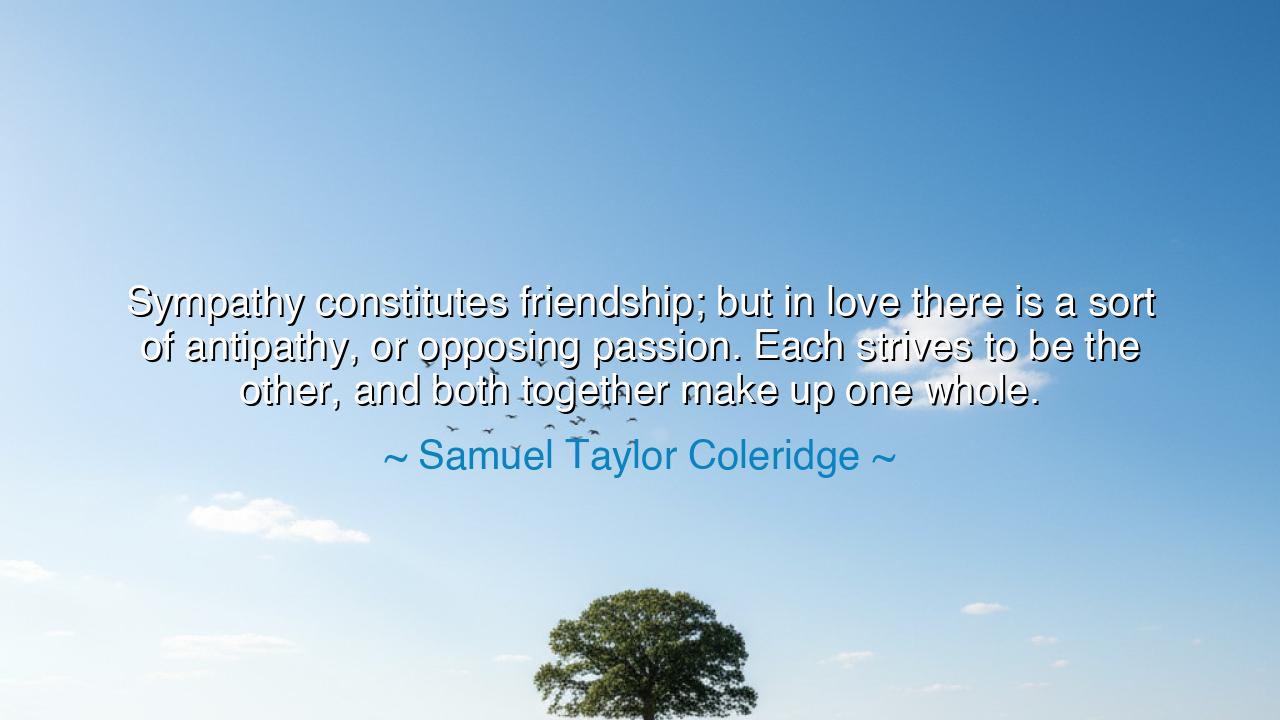
Sympathy constitutes friendship; but in love there is a sort of
Sympathy constitutes friendship; but in love there is a sort of antipathy, or opposing passion. Each strives to be the other, and both together make up one whole.






In the profound and mysterious words of Samuel Taylor Coleridge, poet, philosopher, and dreamer of the Romantic age, there unfolds a truth that pierces the heart of human relationship: “Sympathy constitutes friendship; but in love there is a sort of antipathy, or opposing passion. Each strives to be the other, and both together make up one whole.” To understand this saying is to glimpse the hidden architecture of the soul, for Coleridge speaks of the eternal dance between harmony and conflict, between the serenity of friendship and the storm of love. His words reveal that where friendship seeks likeness, love is born of difference—where friendship unites through peace, love unites through tension.
The origin of this thought lies deep within Coleridge’s own life and philosophy. Living in the 18th and 19th centuries, he stood at the crossroads of reason and emotion, faith and doubt. A thinker influenced by Plato, Kant, and the mystics, he saw in every bond of the heart a reflection of the divine duality that governs all creation: light and shadow, motion and rest, male and female, heaven and earth. To him, friendship was a gentle mirror of the self—a union of souls bound by sympathy, by likeness of thought and purity of affection. But love, ah, love was something far more tumultuous. It was not the calm reflection of one soul in another, but a fire that consumes difference to create unity. It is, as he said, a kind of “antipathy,” not because it is hateful, but because it is charged with opposing forces—each lover longing to merge with the other, yet remaining themselves, forever circling the divine mystery of oneness.
In friendship, there is peace. Two hearts move in parallel, side by side, admiring and supporting one another. Their joy lies in recognition: “You are like me, and therefore I understand you.” This is sympathy—the meeting of equals, the accord of temper and spirit. It is the quiet strength that builds nations and communities, the moral bond that endures the years. Friendship is like a clear river, steady and life-giving, reflecting the light of heaven without turbulence. It is the love of comrades, of those who walk together in mutual respect.
But love, as Coleridge reminds us, is a tempest. It is antipathy—not in the sense of enmity, but of polarity. Each lover feels drawn to the other because they are different, because in the other they find what they lack. The soul is restless until it meets its complement; and when it does, peace and struggle are one. Each seeks to become the other, to bridge the gulf between “I” and “Thou.” Love is not content with likeness; it craves union. And so, lovers are both drawn and repelled, yearning to merge yet resisting dissolution, for the self both desires and fears to lose its boundaries. This tension, this paradox, is what makes love so powerful—and so perilous.
Consider the story of Antony and Cleopatra, whose love shook empires. Antony, the Roman general, embodied reason, power, and discipline; Cleopatra, the queen of Egypt, was passion incarnate—mystery, beauty, and fire. Together they formed a single, burning flame that defied the world. Yet their differences consumed them. Each sought to possess the other completely, and in that striving, they destroyed themselves. Their tragedy, though fatal, revealed the truth of Coleridge’s words: that love is a union of opposites, and only through this clash of souls can wholeness be glimpsed.
And yet, do not mistake this “antipathy” for mere chaos. Coleridge’s insight is not a warning against love, but a revelation of its sacred nature. For in the friction of opposites lies creation itself. Just as thunder follows lightning and the sea rises to meet the shore, so too does love find its strength in difference. When two beings—distinct, imperfect, and incomplete—strive to become one, they reflect the divine unity from which all existence springs. Love, therefore, is the highest mirror of the human soul’s longing for God, the yearning of the finite to touch the infinite.
So, my child, learn this: seek friendship for peace, and cherish love for transformation. Know that friendship sustains you in life’s quiet hours, while love refines you in its furnace. Be not afraid of the struggle within love; it is the fire that purifies the soul. Do not demand that your beloved mirror you—rejoice instead that they differ, for it is through difference that the heart learns wholeness. As Coleridge teaches, each strives to be the other, and together they become complete.
And finally, remember this eternal lesson: life itself is both sympathy and antipathy, both harmony and opposition. Embrace them both, for only through their union can you become whole. Love deeply, but wisely; honor friendship, but do not fear passion. For within these two—friendship and love—resides the secret of the universe: that in striving toward one another, we become more fully ourselves, and in the union of two souls, we catch a fleeting glimpse of eternity.






AAdministratorAdministrator
Welcome, honored guests. Please leave a comment, we will respond soon